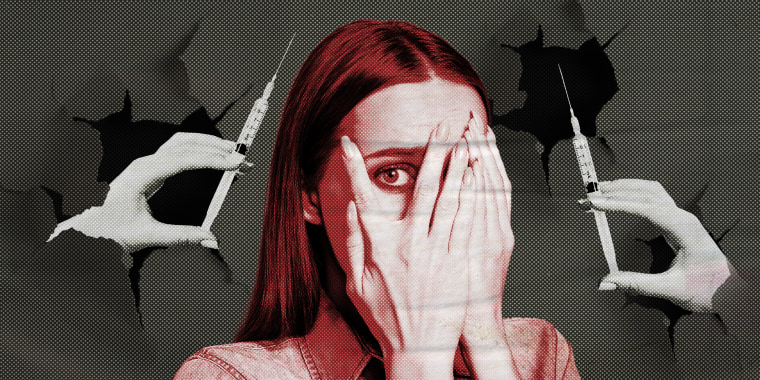Being afraid of needles is common, but for some people, the fear may be so intense that it prevents them from getting important shots, such as the COVID-19 vaccination.
With more vaccine doses on the way and eligibility requirements fading — President Joe Biden said Thursday night that states should allow all adults to be eligible for vaccination by May 1 — many people may be wondering how they can get over their fear before securing an appointment.
The good news? It's definitely possible.
A long-term solution: Exposure therapy
One of the most common treatments for trypanophobia, which is the medical term for extreme fear of needles or injections, is exposure therapy. That's exactly what it sounds like: being exposed to the phobia — in this case, needles — over and over again.
"We may start out with cartoons or pictures and then work up to something a little more live action, maybe someone sticking a syringe into an orange," said Cheryl Carmin, Ph.D., the director of clinical psychology training at The Ohio State University's Wexner Medical Center in Columbus. "So something that may not seem quite real as a place to start, and then moving it closer and closer to what the person does very realistically fear. As long as it wasn't a HIPAA violation, I would try to drag someone over to a blood drawing area in the hospital for them to observe. With each step of observation, you're looking for the person to get more comfortable."
People can practice this technique at home, too, by looking at pictures of needles or watching videos of injections being given. Eventually, people can graduate to practicing the actual experience of getting a shot, using something with a dull point, like a pen or a straightened paper clip, for example.
"Anything that will give you a little sensation will work," said Cody Hostutler, Ph.D., an integrated pediatric primary care psychologist at Nationwide Children’s Hospital in Columbus, Ohio. "Part of what is scary about a shot is that you're giving up control to somebody else, so having a partner or family member or friend practice with you can be really helpful."
The only downside to exposure therapy is that it isn't an overnight fix, and with many people getting last-minute appointments or lucking into leftover doses, they may be looking for some more immediate help. Fortunately, there are many things people can do before, during and even after getting a shot to make the experience more comfortable.
Just need to relax in the moment? Here are some quick tips:
Breathe — or cough!
Taking deep breaths in through the nose and out through the mouth is a simple way to calm down before getting a shot — or in any stressful situation, really.
There's even research that shows that exhaling or coughing while the injection is happening can reduce the pain of getting the shot, Hostutler said.
"It brings attention to another part of your body and overwhelms it with stimulation," he explained. "It doesn't allow your brain to interpret the pain signal as well."
Find a distraction
"Sometimes just talking to the person that’s giving the shot may help," Carmin said.
Many people find that simply looking away is helpful, too.
"There are not all that many people who sit and watch themselves getting a shot or getting their blood drawn," she added.
Related video:
Don't delay by asking questions
People who are anxious about getting a shot often try to delay by asking the doctor or medical provider a lot of questions, but all that does is allow the anxiety to build up, Hostutler said.
It's better to get it over with. Oftentimes anxiety comes from inexperience, so people will usually find after getting the shot that it wasn't as bad as they had anticipated.
Ask for topical anesthetics
Patients can always ask their provider for something to numb the arm before the shot.
It also helps to rub the area where the injection will happen for a few seconds beforehand, which will desensitize the area and help reduce any pain.
Focus on the positive
After the shot, try to talk about the experience in a positive way.
"We have good science that tells us how you talk about a medical procedure or a stressful event affects how you feel about it, which is particularly important for COVID because there are two shots (with some vaccines)," Hostutler said.
At the end of the day, experts say it's important to remember that it's OK to be a little scared.
"This isn't about getting to the point where you’re not fearful at all," Hostutler said. "It's getting to the point where you still feel anxious but you can use these strategies to cope and be able to get the shot to protect your family and yourself."

